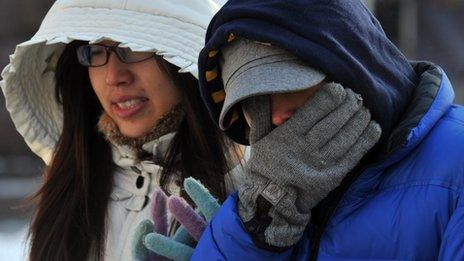Snowfall across parts of Wales remains a weekend risk
- Published
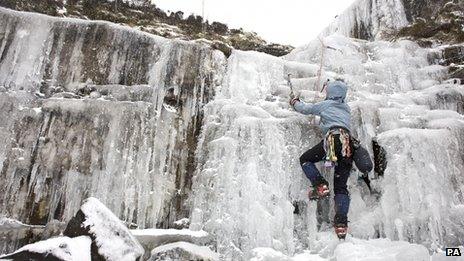
An ice climber at a frozen waterfall in the Brecon Beacons
Snow has brought difficult driving conditions on roads in the Brecon Beacons and heads of the valleys.
Forecasters say snow falling in parts of Wales is likely to to turn to rain later with a change in temperature over the weekend.
A car had to be winched back up an embankment in Ystradgynlais in Powys by fire-fighters but two people inside escaped injury.
Some sports fixtures were hit including racing at Ffos Las, Carmarthenshire.
A band of warmer air is sweeping in from the west, which should also mean thermometers finally begin to climb.
A car with two people inside left an embankment on Varteg Hill in Ysgradgynlais in the Swansea Valley on Saturday afternoon.
Mid and West Fire Service said the road was impassable apart from those travelling in four wheeled drive vehicles.
The ambulance service was called out but was not needed after the incident.
Some sports fixtures were affected.
Horse racing at Ffos Las was abandoned due to frost, despite covers on the track overnight.
"Consideration was given to moving the meeting back 24 hours to Sunday," said a course spokesman. "However, after discussions, it was decided that this was not possible logistically."
Cancelled fixtures
In rugby, the matches at Aberavon, Cardiff, Llandovery, Pontypridd and Tonmawr were early victims.
The South Wales Scorpions rugby league match with Wigan Warriors was switched to the Gnoll in Neath to an all-weather pitch at the Llandarcy academy.
Welsh Premier football matches at Bala and Newtown were called off as was Newport County's FA Trophy tie with Carshalton and Colwyn Bay's Conference North match.
Another sporting fixture in question was at Bangor City Football Club's new stadium, Nantporth.
The club played its very first Welsh Premier league match at the new ground on Saturday, a 2-1 win over Prestatyn in front of more than 700 fans.
It faced two second pitch inspections before the final go-ahead.
"The ground is a bit hard - but we are 95% sure that we can get the match underway if we get a thaw," said a club spokesperson.
The Met Office says a 'yellow alert' for snow remains in force for Saturday in Wales.
The alert is its lowest level of weather threat, but could still mean snow falls of 2cm to 5cm, especially over higher ground.
But the Met Office forecast said that the band of wet weather moving eastwards during the day will turn to rain over north western areas later, before clearing altogether after dark.
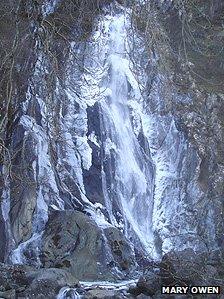
The frozen Aber Falls in Gwynedd
BBC Wales weather presenter, Sue Charles added: "It was another bitterly cold night - not quite as cold as Thursday - the lowest was -9C near Llanwrtyd but along the west Wales coast it fell to 1 or 2 celsius.
"Cloud from the west is bringing the milder Atlantic air - it's probably rain from Anglesey down to Pembrokeshire - turning to snow as it pushes eastwards, with 2-5 cm possible in the hills and higher communities nearer the border.
"Any snow should turn to rain again later in the day."
She said a snow warning was in place but heavy snow is looking less likely.
Flurries were reported by 10:15GMT in south Powys, Ynysybwl, Caldicot, Llantwit Major, along the Herefordshire border and Ebbw Vale.
Rain continues on Saturday night and there will be an ice risk into Sunday morning but it should drier and with some bright spells.
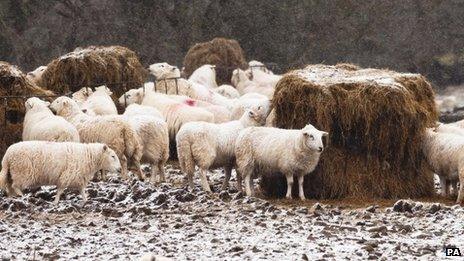
Sheep feeding on hay in the Brecon Beacons
It was also looking milder in Dublin for Wales' Six Nations opener on Sunday but turning increasingly damp and drizzly through the day.
Health check
After a week of freezing temperatures, which reached -11C on Thursday night, Wales' Chief Medical Officer Dr Tony Jewell has urged people to look after their health.
"While we cannot control the weather, there are some simple steps we can all take to help us get through severe conditions as safe and well as possible.
"It is important people wear several layers of clothing and keep their homes warm to reduce the risk of health problems. Drinking hot beverages will help, too.
"Keep unnecessary trips outdoors to a minimum, but if you have to go out, people should wrap up warm with hat, scarves and gloves and take extra care as many of the pavements might be slippery."
- Published3 February 2012
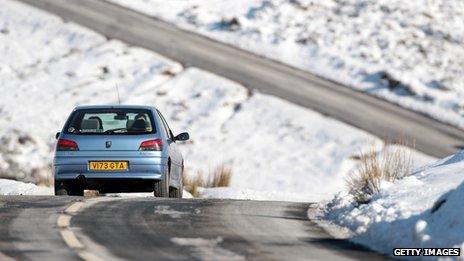
- Published3 February 2012
